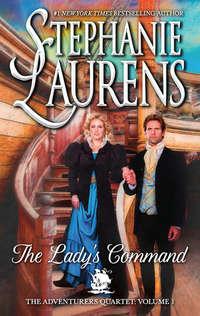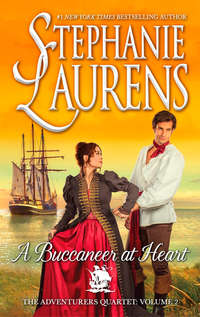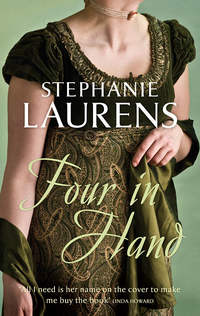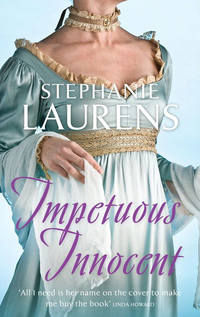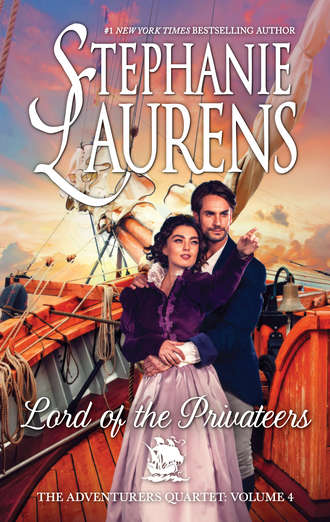
Полная версия
Lord Of The Privateers
Eventually, Bellamy came forward to speak with her. “If you’re ready for luncheon, miss, I’ll summon the captain and the young master.”
“Thank you.” Isobel allowed the old sea dog to gallantly assist her off the bench, then she gathered the journals and logs. “I’ll go down directly.”
Young master. She wondered whether Royd had made any announcement regarding Duncan. Then again, he wouldn’t have had to say a word for his crew to know exactly whose son Duncan was; just seeing father and son together was declaration enough.
Bellamy accompanied her to the aft hatch. While he went on to the upper deck, she went down the stairs and back to the main cabin. She returned the journals and logs to the bookcase; she was closing the doors when she heard Duncan’s feet pattering down the stairs, then thundering along the corridor.
She turned in time to catch him as he hurled himself against her.
“Mama!” He flung his arms around her waist, tipped his head back, and smiled delightedly up at her. “We saw seals—big ones! And lots of gulls.”
She couldn’t resist that smile. She ruffled his hair. “And have you been asking lots of questions?” She knew her son.
“Endless questions.” Royd followed Duncan in; his tone was long-suffering, but his face was alight—as alight as Duncan’s.
The large desk was their table; Isobel sat at one end while Duncan took the place at the front of the desk, facing Royd, who settled in his accustomed chair.
While she smiled at Bellamy and complimented him on the finely sliced corned beef he set before them, she wondered what tack Royd’s calculating mind was taking with respect to Duncan. And herself. In the instant Royd had set eyes on Duncan, their lives—Duncan’s, hers, and Royd’s—had irreversibly changed.
What she didn’t yet know was where that change had landed them. While she would have infinitely preferred to control everything to do with Duncan, now Royd knew of his existence, there was no point imagining she could sit back and hope that Royd would grow bored with the demands of parenthood and lose interest in his son.
She’d told him she would never let anyone take Duncan from her, but from what she’d seen of their interactions, of Royd’s protectiveness and the patience he displayed in dealing with Duncan’s incessant questions, Royd releasing Duncan to her sole care was not going to happen, either.
They—she and Royd, and Duncan, too—were going to have to find common ground, but exactly what such ground might look like, at this stage, she couldn’t begin to guess.
Duncan didn’t speak but applied himself assiduously to taking the edge from his ever-present hunger. Royd watched his son, studying Duncan while he, too, ate. Isobel watched them both, curious as to how they were getting on—curious to see how Royd managed. She’d definitely thrown him into deep water in terms of dealing with a son.
Then again, in all contexts, Royd was an excellent swimmer.
With the worst of his hunger assuaged, Duncan looked at Royd and started asking about ropes and knots.
Royd answered easily.
Isobel kept her attention on her plate.
But eventually, Duncan looked at her. She felt his gaze, looked up, and, for once, couldn’t define the expression in his dark-brown eyes. Then he transferred his gaze to Royd. “You said you’re married to Mama. So what’s my name? My proper full name?”
Royd’s gaze swung her way.
She met it, but not knowing what he’d said to Duncan—and unable to dispute that, in a way, they were, indeed, married—she didn’t know what to say.
Royd looked at Duncan and met his gaze levelly. “What name have you been going by?”
“Duncan Carmody.”
Royd nodded as if having expected that; he probably had. “Your full name is Duncan Carmody Carmichael Frobisher.” He glanced at her and arched a brow.
When Duncan looked at her, she forced herself to nod. “Yes. That’s correct.” She met her son’s gaze. “That is your full name.”
Silently, Duncan repeated the four words, then grinned. “Good.”
He’d finished his meal; he set his cutlery down and reached for the apple Bellamy had left for him. Duncan crunched into the fruit, chewed, swallowed, then asked, “Can I go back on deck?”
She’d eaten enough. Royd had cleaned his plate and was sitting back in his chair, observing. A touch unnerved by the apparent domesticity, she pointed to the glass in front of Duncan. “Finish your milk, and then we’ll go up.”
Duncan seized the glass, drained it, then he grabbed his napkin and wiped off the resulting milky mustache. “I’m ready.”
She rose; so, too, did Royd. She followed Duncan from the cabin, and Royd followed her.
Once again, she retreated to the bench in the bow, and while watching Royd and Duncan, revisited the questions to which she still lacked answers.
Royd opted to leave the wheel in Liam Stewart’s care and spent the next half hour teaching Duncan a set of basic nautical knots. Eventually consigning Duncan to the tutelage of his bosun, Jolley, to learn more about where and when the different knots were used, Royd strolled to the bow.
On reaching Isobel, he met her dark gaze, then turned and sat by her feet. He rested his forearms on his thighs and clasped his hands. “Well?”
He was perfectly sure she had questions.
“The mission you were sent on after we handfasted. You originally expected it to last only for a month or so. Why did it take so long?”
He knew what he’d written in his journal. He’d reread it many times over the years, whenever the question of whether he could have done anything other than what he had—and thus not lost her—became too insistent and had to be, once again, put to rest. “The original mission was to infiltrate the court of the Dey of Algiers and confirm that he was capturing, holding, and eventually selling Europeans as slaves. In order to do that, I had to pose as a half-French emissary of an Arabic slave trader. I succeeded in getting access to the Dey’s slave pens—where I discovered over three thousand Europeans. That was a far larger number than anyone had imagined. Originally, I was supposed to simply learn the number and then get out and report to Exmouth, who was supposed to be at Gibraltar. But Exmouth came in early and stood off the port of Algiers, thinking to intimidate the Dey into releasing his European captives.”
“And instead, the Dey dug in his heels.”
He nodded. “Rather than report to Exmouth in person, I sent Liam Stewart—I wasn’t all that sure I could keep a civil tongue in my head, but more importantly, I couldn’t risk being seen and recognized boarding Exmouth’s ship. And with Exmouth flying the flag in such a bellicose fashion, I couldn’t risk taking The Corsair—which was masquerading as a corsair’s vessel—out of the harbor. But sending Liam turned out to be a miscalculation. Unknown to me, Exmouth had demanded and been given command over my mission. I hadn’t expected that, but it was around the time Dalziel—my previous commander—was pulling back. Whitehall assumed Exmouth would deal with the Dey without any great problem, and I was, after all, a privateer—giving an admiral command over my mission seemed appropriate to them. By sending Liam, I missed our only chance to retake the reins of the mission, at least as related to me and The Corsair. Liam was in a position to receive orders, but he wasn’t in a position to refuse orders, as I might have done.”
“So it was Exmouth’s orders that kept you in Algiers?”
“Initially. But the longer the stalemate went on, the more essential it became that I remained in position in the Dey’s court. Without the intelligence I provided, Exmouth had no way of knowing what was going on inside the walls—what was happening to the slaves, and what the Dey was planning.” He paused, then added, “It became impossible for me to pull back.”
She’d read his notes; now she had the broader context. He waited, knowing the most critical of her questions was yet to come.
Eventually, she said, “You dithered over sending me a letter. You never dither.”
He snorted. She was right. But over that... “Once I realized I was stuck, and the negotiations between the Dey and Exmouth looked set to drag on for months, I wanted to write, at least to let you know that I was unavoidably detained. But by then the blockade was increasingly tense. I couldn’t leave the city—by then, I couldn’t easily leave the palace. My men were running messages out to Exmouth. While The Corsair could slip out of the harbor—the fleet knew her and would have let her past—she wouldn’t have been able to sail in again, not without being marked as an enemy, along with all those on her.” He paused, remembering. “Several of my crew—Stewart, Bellamy, Jolley, and others—offered to take a letter and, using a rowboat, slide around the blockade in order to get the letter out to you. They would have had to go to Gibraltar. But the French were hanging off, beyond the fleet, looking to make mischief. They didn’t dare bother Exmouth, especially as he had the Dutch fleet at his back, but if the French had intercepted a letter from me, as me, to you...they would have taken great delight in informing the Dey as to whom, exactly, he was entertaining.”
“The risk was too great.”
He looked at his clasped hands. “My life, my crew’s lives, and the lives of over three thousand captives—that was what hung in the balance.” He wasn’t overstating the matter. “I had to let all notion of contacting you go.”
And he’d believed she’d loved him enough to overlook his silence.
In retrospect, that had been his biggest miscalculation, but even now, he couldn’t imagine doing anything other than what he’d done.
“Exmouth bombarded Algiers in late August.” He may as well give her the complete picture. “All the targets in the city that were hit were ones I’d identified—the armory, the magazine, the barracks. The Dey capitulated and surrendered the European slaves. But he sent out only just over a thousand—those from one set of pens. So I had to remain until we got all the Europeans released. It took until March the following year. Only once that was done was I free to drop my disguise, reboard The Corsair, and sail home.”
In what had turned into a very bitter victory.
Minutes ticked past. Neither of them spoke. The bow rose and fell; water susurrated against the sides as the prow cleaved through the waves.
She stirred. “Looking back at what happened...it was inevitable in the circumstances. It was no one’s fault.”
A few days ago, he wouldn’t have agreed, but after hearing her version of events... “Inevitable because you didn’t know why I’d stayed away.”
“Yes.” Isobel hesitated, but she’d always wondered about what had happened next. “And you didn’t try to explain. After I told you to go away, you walked away and left it at that.”
“No.” For the first time since he’d sat by her feet, he turned his head and, frowning, met her gaze. “I tried twice to see you—precisely to explain.”
She frowned back. “When?”
“The first time was two days after. It took me that long to...convince myself I had to speak to you.” He faced forward. “That I needed to make you understand.” He paused, then said, “I was met at the door by one of your older cousins. She told me in no uncertain terms that you didn’t want to see me.”
A chill touched her heart. In a low voice, she said, “I never knew you’d come.”
He looked down at his clasped hands. “I thought perhaps you were still in a snit—I tried again a week later. Another cousin turned me away with a flea in my ear.”
She looked at Duncan, sitting cross-legged beside Jolley and busily knotting rope. “They were trying to protect me—they knew about Duncan.”
A shudder ran through Royd’s large frame. She glanced at him; he was staring at his linked hands. His fingers were gripping hard, then abruptly they eased. In a low, almost tortured voice, he said, “I’d been the central cog in a long and difficult mission—I’d saved three thousand lives and got away with my crew and myself unharmed. I was...a hero by anyone’s standards, yet you didn’t want to know. That’s how I saw it.”
His chest swelled.
Her gaze locked on his profile, she didn’t expect him to say more, yet she waited, breath bated...
“I was so damned hurt! No, worse—it felt like a wound, a stab wound more deadly than any I’d ever taken.” His voice was raw, his tone harsh. “You were the only one I’d ever let so close—you were the only one who could ever have hurt me like that. And you did.”
The sounds of the sea—of the wind, the waves, the sails, and the gulls—surrounded them and held them in a cocoon of remembered pain.
Then he drew a huge breath and, raising his head, exhaled. “So yes, I walked away. From you, from us. From everything we’d been to each other.” More evenly, he stated, “There was no other way for me to go on.”
She didn’t need to think to know that everything he’d said had been the literal truth. His expression might be unreadable, impenetrable, but this was Royd; she’d always been attuned to his moods, his emotions. His feelings rippled over her awareness; she sensed them in the same way a blind person used touch to read.
“I thought then,” he went on, once again gazing at his clasped hands, “that while I’d been away fighting for king and country, you’d fallen out of love with me. That you’d changed your mind. That whatever had been between us, it hadn’t been love, the sort that never died—that that hadn’t been a part of our equation at all.” He lifted one shoulder. “What else was I to think?”
Rocked by the intensity of his feelings—she’d forgotten how powerful his emotions were—she felt as if, once again, she was reeling.
Then he turned his head and looked at her. The unshielded emotions in his gray gaze sliced effortlessly through her defenses; they might as well not have been there. Then he said, his tone hard but even, “You didn’t fight for us, either.”
She held his piercing gaze. “I didn’t know there was an ‘us’ worth fighting for.”
Royd held to the contact, to the steadiness in her dark-brown eyes; she’d ever been his anchor, his safe harbor through any storm. But this storm raged between them, created of them, yet it seemed they now stood at the eye, with the past behind them, but no clear view of what might lie ahead. Of what future they might have.
Your future will be what you make of it.
His father’s words. Oh, so true.
“Now we both know the truth of what happened eight years ago, is there an ‘us’ worth fighting for now?”
The critical question.
She didn’t look away; she felt the weight of the moment as acutely as he.
After several silent seconds, she drew breath and simply said, “I don’t know, but there might be.” Her gaze flicked past him, down the deck. “And then there’s Duncan.”
He followed her gaze to where their son was diving headfirst into his heritage.
He considered the sight, then replied, “As there is, indeed, Duncan, I suggest ‘might be’ is a possibility you and I need to explore.”
She returned her gaze to his face.
He turned his head and met her eyes.
Her gaze was steady and unwavering.
He realized he was holding his breath.
Then she nodded. “To confirm or eliminate—we can’t go forward without knowing...what might be.”
* * *
Royd spent the rest of the afternoon with William Kelly, going over charts and plotting the fastest route from Southampton to Freetown. He made no attempt to advance his position with respect to his de facto wife and his son until, seated about his desk in the main cabin, the three of them had dined, and after having cleared their plates, Bellamy produced a blancmange for Duncan.
How his steward had managed to concoct such a thing while at sea, Royd couldn’t imagine, but as he watched Duncan’s eyes light, he couldn’t help but smile. Duncan babbled his thanks, then attacked the treat. Satisfied, Bellamy withdrew.
Duncan glanced at Royd and—predictably—posed another question; having learned of knots and ropes to his immediate satisfaction, his interest had shifted to sails.
Royd dutifully listed the sails The Corsair flew, expounding on when each set was deployed and what weather conditions limited their use.
Throughout, his senses remained trained on Isobel.
The task of rewinning her was going to be a great deal more demanding than winning over Duncan, even though he suspected that more of what she’d once felt for him remained in her heart than she’d yet let him see. As far as he could tell, he had reason enough to hope that, under her prickly carapace, she still loved him.
God knew, he still loved her.
After their discussion in the bow—which he didn’t want to revisit even in his mind; just the thought of what had fallen from his lips left him feeling naked and vulnerable—she’d retreated somewhat. Just half a step, enough to think things through. That was her way. She tended to stand back and assess before stepping forward, while he forged on, assessing as he went.
That was why, in all their childhood adventures, she’d always followed rather than led. Not because she was any less adventurous but because she possessed at least one cautious instinct.
He wasn’t sure he possessed any such instincts at all. Any caution he brought to bear derived from a single-minded drive to succeed, to win—a recognition that sometimes winning required caution. In pursuit of a prize, he could be cautious. He could be patient.
He was going to have to be patient to win the particular prize he’d set his heart on. Dealing with Isobel had never been easy. Challenging, exhilarating, and satisfying, undoubtedly. Easy, no.
But she’d admitted to a “might be,” and at present, that was enough. He wasn’t going to push her; that way lay dragons.
That didn’t mean he couldn’t shore up his position. Not sharing all aspects of his life with her had been his critical misstep in the past; that wasn’t a mistake he would make again.
By the time Duncan had scraped every skerrick of blancmange from the bowl and downed the last of his milk, Royd had decided on his next step.
He waited while Isobel oversaw Duncan’s nighttime ablutions, then tucked him into the bed built out from the ship’s side and dropped a motherly kiss on his forehead. Royd stepped back from the doorway as she returned to the main cabin. Once she’d shut the connecting door, he tipped his head toward the door to the cabin he was using. “Now you’ve caught up with the past, perhaps you’d like to learn what I know of what’s going on in Freetown.”
Curiosity flared in her eyes.
His words hadn’t been any real question; he didn’t wait for an answer. She followed readily as he walked to the connecting door, opened it, and went in. He’d left a lantern burning. She hesitated on the threshold, then her gaze fixed on the documents he’d left on the bed’s coverlet.
He waved her to them. “That’s all the information I’ve received to this point. The letters are in order.”
She walked in, picked up the sheaf, sat on the bed, and started reading.
He leaned against the washstand and indulged himself by watching her. The decision to show her the letters hadn’t been a difficult one. He’d unwittingly taught her she couldn’t trust him to be entirely open with her; it was therefore up to him to demonstrate that he’d changed his tack and that she could henceforth have confidence that he would share all with her.
Fifteen minutes later, she reached the end of the last missive—Wolverstone’s recent summons. She set the sheet down on top of the inverted pile, then raised her head and met his gaze. “You said you were on a mission that echoed that one eight years ago. I can see why—it’s white slavers again. And in Africa, although a different part.” Her eyes searched his face. “In the letter from Declan, he said his wife, Lady Edwina, believed several young women had been taken by the slavers. Do you think Katherine might be among them?”
He caught her gaze. “It’s possible—perhaps even likely—but with luck, we’ll learn if your quest and my mission are one and the same soon enough.” He paused, only then realizing she might not be all that keen to meet his brothers again, not in his company, not in the present circumstances. Regardless... “The Corsair is headed for Southampton to provision for the voyage to Freetown, but I have to go to London—to receive my orders, learn everything Declan and Edwina, and also Robert and Miss Aileen Hopkins, can tell me, and most important of all, to be there when Caleb gets back, so I can hear his report firsthand and glean the most detailed information on the slavers and the suspected mining camp. If I’m to successfully take the camp, I need to learn as much about it as I can.”
She gestured at the letters. “They don’t spell it out, but I take it your mission will be to rescue those taken and capture the villains behind the scheme.”
He nodded. “In that order, at least in my mind. As you no doubt noted, there’s political pressure building over bringing the perpetrators to justice, and from the tone of communications thus far, I expect to be charged with securing evidence sufficient to convict whoever’s involved. I will if I can. However, my overriding objective will be to get the captives—however many there are and whoever they are—to safety.”
“Indeed.” She folded her hands in her lap and met his gaze challengingly. “I’ll accompany you to London.”
She expected an argument. He hid a grin and inclined his head. “We’ll leave the ship tomorrow morning. I’ll have Liam lay in to Ramsgate so we can go ashore, then the ship will proceed to Southampton, provision, and stand ready.”
She frowned. “Duncan.” After a second of staring into space, she refocused on his face. “Do you think there’s any viable way to send him back to Aberdeen?”
“Quite aside from the battle you would have to pry him from the ship, I can’t imagine any way I would want to risk it.” He paused, then said, “He stowed away. From what I gathered, he managed the feat of escaping Carmody Place and all those who no doubt keep an eye on him there and managed to get himself to the docks and aboard The Corsair all by himself. If you try to send him home now, after he’s had his boots on my deck, what do you think is most likely to happen?”
She grimaced.
Dryly, he added, “You only need to consider how his parents would react in the same situation. He is, after all, both of us combined. Attempting to send him home at this point will be wasted effort—and, incidentally, effort and time neither you nor I have to spare.”
Isobel stifled a sigh. “You’re right. If we try to send him home in the care of anyone but you or me, I wouldn’t put it past him, glib-tongued and quick-witted as he is, to slip his leash and board some other ship bound for Freetown...and the risks of such an action don’t bear thinking of.” She paused, then refocused on Royd. “So what do you suggest?”
He told her.
Of course, he’d already seen the potential problem and had worked out a solution.
She had to admit it was a workable plan, one that would assuage her motherly concerns while at the same time allowing Duncan to do what he now needed to do—namely, to get to know his father. And that was best done on The Corsair. Regardless of what happened between her and Royd, Duncan’s relationship with Royd was now a nascent reality, one that needed to be given time to develop and evolve.
She’d always felt deeply guilty over denying Duncan the father he’d desperately wanted. Now that, viewed through his ship-mad boy’s eyes, he’d discovered his father far surpassed most normal mortals, she couldn’t in all conscience deny him more time with Royd. And she harbored no doubts that on The Corsair, Duncan would be safe.
“All right.” She thought, then added, “If you can convince him to stay aboard while we go to London, we’ll follow your plan.”
That plan hadn’t specifically covered what to do with Duncan while they detoured to London, but Royd nodded. “While in London, I’ll need to focus on the mission, on learning everything I can and dealing with Wolverstone and Melville. Especially Melville and his political pressures. I assume you’ll be similarly involved in pursuing all pertaining to Katherine and her whereabouts. Leaving Duncan in the care of people he doesn’t know, and with whom he shares no affinity, would be senseless, and neither you nor I will need the additional distraction of having to explain his existence to Declan, Edwina, and Robert at this time.”





